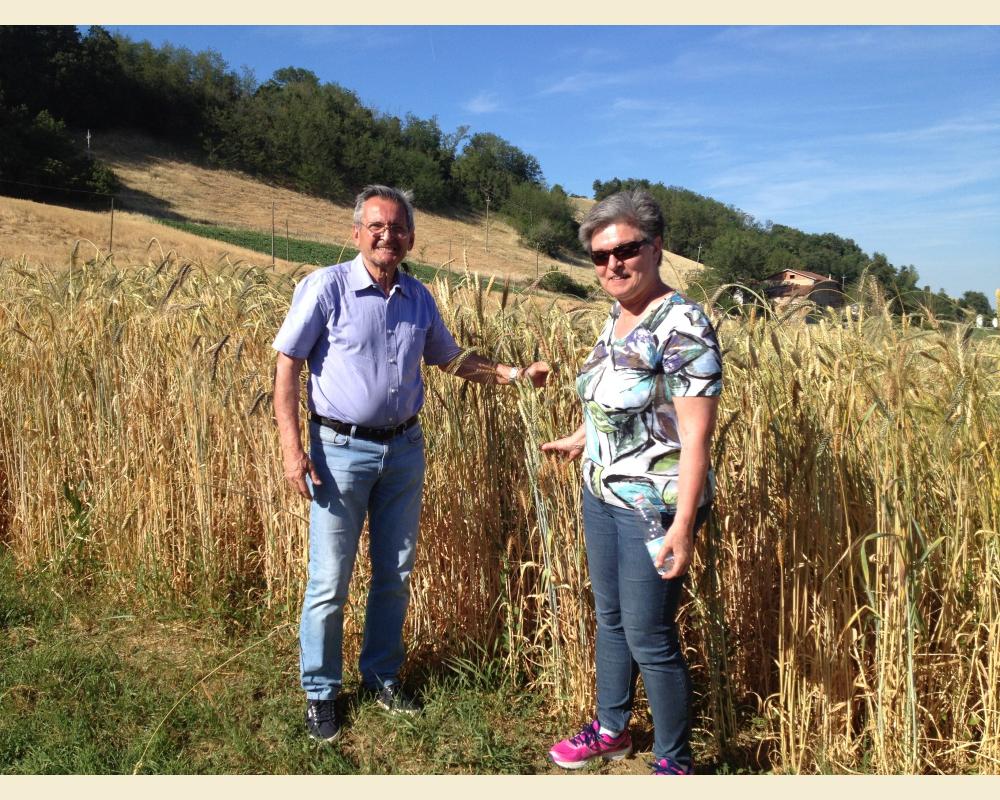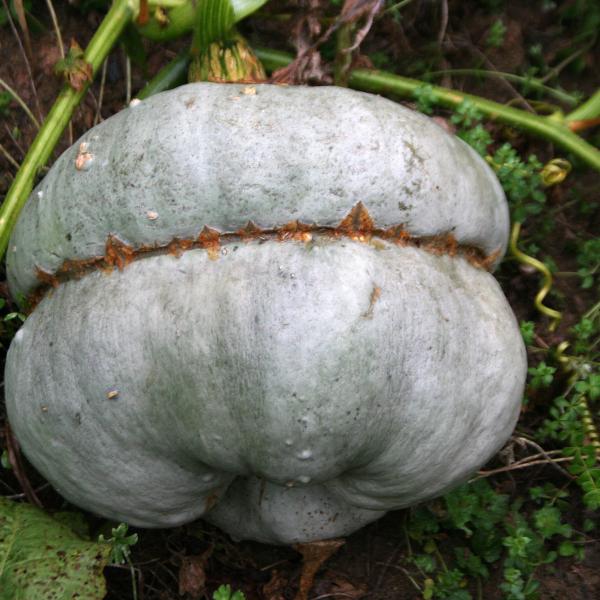Sowing the future: there is more pleasure in being different!
25.02.22

Friday, December 17 at 4 pm, the Conference “Biodiversity, World Heritage” will be held at the Rubano Ethnographic Park (Padua) with geneticists Salvatore Ceccarelli and Stefania Grando to talk about seeds, diversity, and tomorrow's food. Book a seat in the cinema by writing to sportello@aiabveneto.org or watch the event in streaming on the FB pages of Aiab and El Tamiso.
Rubano, December 13, 2021_What do climate, a wheat field, nutrition, development, the taste of food, biodiversity and health have in common? The answer is simple: seeds. Seeds are now more than ever at the center of global debates, including climate change, food justice, and possible models of sustainable development. And since all food comes from seeds, this is where we must start again to change the way in which food is produced and guarantee biodiversity.
Most farms use seeds belonging to a single variety, selected for characteristics such as productivity or resistance to diseases. The plants, for example, in a wheat field, are all the same. And so is the flavor, identical to one hundred thousand other wheat fields. If we add to this that, in just over twenty years, the global seed system has dramatically changed from thousands of companies to a few dozen corporations, of which just three control more than 60% of the seed market (and the pesticide market), it is clear that whoever controls the seed market controls food sovereignty. The problem of seed monopoly, in addition to representing an ethical critical issue, over time has led to a uniformity of fields and the loss of biodiversity. At the nutritional level, this translates into a decrease in diversity in the intestinal flora, which is susceptible to greater inflammation.
So how can seeds contain strength and diversity to counteract the disastrous effects of climate change and food impoverishment? Can farmers become guardians of environmental heritage? These questions will be answered by the world-renowned geneticists Salvatore Ceccarelli and Stefania Grando, at the conference “Biodiversity, World Heritage. The seeds of the future: evolutionary populations” to be held on Friday, December 17 at 4 pm at the Rubano Ethnographic Park (Padua). The event, promoted by Aiab Veneto under the patronage of the City of Rubano, will take place in person upon reservation (sportello@aiabveneto.org) and will be broadcast live on the Facebook pages of Aiab Veneto and El Tamiso.
The theory of Ceccarelli and Grando is based on an effective idea: the use of a 'mixture' (or rather, an evolutionary population) of seeds of the same species, instead of a uniform variety. After sowing, the crossings that always take place in nature mean that the seed that is collected is never exactly what was sown. Populations evolve and adapt better to that particular place, better resisting abiotic stress, parasites, diseases and weeds. A strategy that makes diversity, and not uniformity, its strong point.
“Local agriculture and urban agriculture are the future - says Carlo Bettio, Slow Food manager of the Padua Conduct - The winning secret is to use ancient seeds with modern tools.” And he adds: “I am happy that this conference is being held at the Ethnographic Park, the perfect place for the dissemination of ideas, which are like seeds: they travel the world and create identity.”
A question, that of identity, that cannot be separated from the place where we live. “The environment must be a central theme of political commitment - says the mayor of Rubano Sabrina Doni - when economic sustainability meets environmental and social sustainability, virtuous intertwining is created that, here in Rubano, we can happily touch at the Ethnographic Park.”
Park that has been collaborating with the El Tamiso Agricultural Cooperative for years, as recalled by the President of the Cooperative Franco Zecchinato, “El Tamiso has been promoting organic agriculture since 1984. The novelty this year was the planting of an evolutionary population of “Furat” soft grains, studied by Salvatore Ceccarelli and Stefania Grando, at the foot of the Euganean Hills. Our hope is to be able to obtain good flour to make bread, which thanks to the collaboration with the Ethnographic Park, we can bake in their oven. I like to think that the seed is a perfect spaceship for traveling through time and space, and this is a complete circle that closes.”
The director of the Park, Anna Michelotto, adds: “Our reality was founded 30 years ago from the desire to have a place that lends itself to formative, aggregative and cultural moments. For ten years we have also had a wood-burning oven: not only a mere tool for cooking, but a real meeting point, of exchange, culture, and tradition.”
So why cultivate evolutionary populations today? “Because it means reducing or eliminating the use of chemistry - conclude Ceccarelli and Grando - adapting crops to climate change, preserving agro-biodiversity and developing new ones, increasing yields in marginal cropping systems, returning seeds to farmers' hands, eating more varied and healthy foods. To do all this, an agricultural system is needed that combines attention to the environment with the direct involvement of those who do agriculture, those who work there, those who daily strengthen their relationship with the territory that surrounds them, not only for themselves but for everyone.”
A system, in short, that does not work for farmers, but with farmers.
contacts
Aiab Veneto | www.aiabveneto.org
Rubano, December 13, 2021_What do climate, a wheat field, nutrition, development, the taste of food, biodiversity and health have in common? The answer is simple: seeds. Seeds are now more than ever at the center of global debates, including climate change, food justice, and possible models of sustainable development. And since all food comes from seeds, this is where we must start again to change the way in which food is produced and guarantee biodiversity.
Most farms use seeds belonging to a single variety, selected for characteristics such as productivity or resistance to diseases. The plants, for example, in a wheat field, are all the same. And so is the flavor, identical to one hundred thousand other wheat fields. If we add to this that, in just over twenty years, the global seed system has dramatically changed from thousands of companies to a few dozen corporations, of which just three control more than 60% of the seed market (and the pesticide market), it is clear that whoever controls the seed market controls food sovereignty. The problem of seed monopoly, in addition to representing an ethical critical issue, over time has led to a uniformity of fields and the loss of biodiversity. At the nutritional level, this translates into a decrease in diversity in the intestinal flora, which is susceptible to greater inflammation.
So how can seeds contain strength and diversity to counteract the disastrous effects of climate change and food impoverishment? Can farmers become guardians of environmental heritage? These questions will be answered by the world-renowned geneticists Salvatore Ceccarelli and Stefania Grando, at the conference “Biodiversity, World Heritage. The seeds of the future: evolutionary populations” to be held on Friday, December 17 at 4 pm at the Rubano Ethnographic Park (Padua). The event, promoted by Aiab Veneto under the patronage of the City of Rubano, will take place in person upon reservation (sportello@aiabveneto.org) and will be broadcast live on the Facebook pages of Aiab Veneto and El Tamiso.
The theory of Ceccarelli and Grando is based on an effective idea: the use of a 'mixture' (or rather, an evolutionary population) of seeds of the same species, instead of a uniform variety. After sowing, the crossings that always take place in nature mean that the seed that is collected is never exactly what was sown. Populations evolve and adapt better to that particular place, better resisting abiotic stress, parasites, diseases and weeds. A strategy that makes diversity, and not uniformity, its strong point.
“Local agriculture and urban agriculture are the future - says Carlo Bettio, Slow Food manager of the Padua Conduct - The winning secret is to use ancient seeds with modern tools.” And he adds: “I am happy that this conference is being held at the Ethnographic Park, the perfect place for the dissemination of ideas, which are like seeds: they travel the world and create identity.”
A question, that of identity, that cannot be separated from the place where we live. “The environment must be a central theme of political commitment - says the mayor of Rubano Sabrina Doni - when economic sustainability meets environmental and social sustainability, virtuous intertwining is created that, here in Rubano, we can happily touch at the Ethnographic Park.”
Park that has been collaborating with the El Tamiso Agricultural Cooperative for years, as recalled by the President of the Cooperative Franco Zecchinato, “El Tamiso has been promoting organic agriculture since 1984. The novelty this year was the planting of an evolutionary population of “Furat” soft grains, studied by Salvatore Ceccarelli and Stefania Grando, at the foot of the Euganean Hills. Our hope is to be able to obtain good flour to make bread, which thanks to the collaboration with the Ethnographic Park, we can bake in their oven. I like to think that the seed is a perfect spaceship for traveling through time and space, and this is a complete circle that closes.”
The director of the Park, Anna Michelotto, adds: “Our reality was founded 30 years ago from the desire to have a place that lends itself to formative, aggregative and cultural moments. For ten years we have also had a wood-burning oven: not only a mere tool for cooking, but a real meeting point, of exchange, culture, and tradition.”
So why cultivate evolutionary populations today? “Because it means reducing or eliminating the use of chemistry - conclude Ceccarelli and Grando - adapting crops to climate change, preserving agro-biodiversity and developing new ones, increasing yields in marginal cropping systems, returning seeds to farmers' hands, eating more varied and healthy foods. To do all this, an agricultural system is needed that combines attention to the environment with the direct involvement of those who do agriculture, those who work there, those who daily strengthen their relationship with the territory that surrounds them, not only for themselves but for everyone.”
A system, in short, that does not work for farmers, but with farmers.
contacts
Aiab Veneto | www.aiabveneto.org
PREVIOUS ARTICLE
25. 02. 22
25.02.22
Zucca priest hat
And here are the first fruits of the “Ecotypes — freedom of seeds” project, the Cappello da Prete pumpkin, cultivated by Franco Zecchinato's “Biancospino” company in Albignasego. We propose ...
Read




